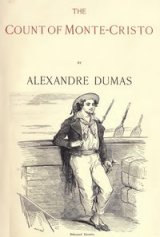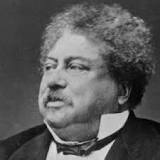The Count of Monte Cristo Page #25
The Count of Monte Cristo is an adventure novel by French author Alexandre Dumas completed in 1844. It is one of the author's most popular works, along with The Three Musketeers.
Danglars alone was content and joyous—he had got rid of an enemy and made his own situation on the Pharaon secure. Danglars was one of those men born with a pen behind the ear, and an inkstand in place of a heart. Everything with him was multiplication or subtraction. The life of a man was to him of far less value than a numeral, especially when, by taking it away, he could increase the sum total of his own desires. He went to bed at his usual hour, and slept in peace. Villefort, after having received M. de Salvieux’s letter, embraced Renée, kissed the marquise’s hand, and shaken that of the marquis, started for Paris along the Aix road. Old Dantès was dying with anxiety to know what had become of Edmond. But we know very well what had become of Edmond. Chapter 10. The King’s Closet at the Tuileries We will leave Villefort on the road to Paris, travelling—thanks to trebled fees—with all speed, and passing through two or three apartments, enter at the Tuileries the little room with the arched window, so well known as having been the favorite closet of Napoleon and Louis XVIII., and now of Louis Philippe. There, seated before a walnut table he had brought with him from Hartwell, and to which, from one of those fancies not uncommon to great people, he was particularly attached, the king, Louis XVIII., was carelessly listening to a man of fifty or fifty-two years of age, with gray hair, aristocratic bearing, and exceedingly gentlemanly attire, and meanwhile making a marginal note in a volume of Gryphius’s rather inaccurate, but much sought-after, edition of Horace—a work which was much indebted to the sagacious observations of the philosophical monarch. “You say, sir——” said the king. “That I am exceedingly disquieted, sire.” “Really, have you had a vision of the seven fat kine and the seven lean kine?” “No, sire, for that would only betoken for us seven years of plenty and seven years of scarcity; and with a king as full of foresight as your majesty, scarcity is not a thing to be feared.” “Then of what other scourge are you afraid, my dear Blacas?” “Sire, I have every reason to believe that a storm is brewing in the south.” “Well, my dear duke,” replied Louis XVIII., “I think you are wrongly informed, and know positively that, on the contrary, it is very fine weather in that direction.” Man of ability as he was, Louis XVIII. liked a pleasant jest. “Sire,” continued M. de Blacas, “if it only be to reassure a faithful servant, will your majesty send into Languedoc, Provence, and Dauphiné, trusty men, who will bring you back a faithful report as to the feeling in these three provinces?” “Canimus surdis,” replied the king, continuing the annotations in his Horace. “Sire,” replied the courtier, laughing, in order that he might seem to comprehend the quotation, “your majesty may be perfectly right in relying on the good feeling of France, but I fear I am not altogether wrong in dreading some desperate attempt.” “By whom?” “By Bonaparte, or, at least, by his adherents.” “My dear Blacas,” said the king, “you with your alarms prevent me from working.” “And you, sire, prevent me from sleeping with your security.” “Wait, my dear sir, wait a moment; for I have such a delightful note on the Pastor quum traheret—wait, and I will listen to you afterwards.” There was a brief pause, during which Louis XVIII. wrote, in a hand as small as possible, another note on the margin of his Horace, and then looking at the duke with the air of a man who thinks he has an idea of his own, while he is only commenting upon the idea of another, said: “Go on, my dear duke, go on—I listen.” “Sire,” said Blacas, who had for a moment the hope of sacrificing Villefort to his own profit, “I am compelled to tell you that these are not mere rumors destitute of foundation which thus disquiet me; but a serious-minded man, deserving all my confidence, and charged by me to watch over the south” (the duke hesitated as he pronounced these words), “has arrived by post to tell me that a great peril threatens the king, and so I hastened to you, sire.” “Mala ducis avi domum,” continued Louis XVIII., still annotating. “Does your majesty wish me to drop the subject?” “By no means, my dear duke; but just stretch out your hand.” “Which?” “Whichever you please—there to the left.” “Here, sire?” “I tell you to the left, and you are looking to the right; I mean on my left—yes, there. You will find yesterday’s report of the minister of police. But here is M. Dandré himself;” and M. Dandré, announced by the chamberlain-in-waiting, entered. “Come in,” said Louis XVIII., with repressed smile, “come in, Baron, and tell the duke all you know—the latest news of M. de Bonaparte; do not conceal anything, however serious,—let us see, the Island of Elba is a volcano, and we may expect to have issuing thence flaming and bristling war—bella, horrida bella.” M. Dandré leaned very respectfully on the back of a chair with his two hands, and said: “Has your majesty perused yesterday’s report?” “Yes, yes; but tell the duke himself, who cannot find anything, what the report contains—give him the particulars of what the usurper is doing in his islet.” “Monsieur,” said the baron to the duke, “all the servants of his majesty must approve of the latest intelligence which we have from the Island of Elba. Bonaparte——” M. Dandré looked at Louis XVIII., who, employed in writing a note, did not even raise his head. “Bonaparte,” continued the baron, “is mortally wearied, and passes whole days in watching his miners at work at Porto- Longone.” “And scratches himself for amusement,” added the king. “Scratches himself?” inquired the duke, “what does your majesty mean?” “Yes, indeed, my dear duke. Did you forget that this great man, this hero, this demigod, is attacked with a malady of the skin which worries him to death, prurigo?” “And, moreover, my dear duke,” continued the minister of police, “we are almost assured that, in a very short time, the usurper will be insane.” “Insane?” “Raving mad; his head becomes weaker. Sometimes he weeps bitterly, sometimes laughs boisterously, at other time he passes hours on the seashore, flinging stones in the water and when the flint makes ‘duck- and-drake’ five or six times, he appears as delighted as if he had gained another Marengo or Austerlitz. Now, you must agree that these are indubitable symptoms of insanity.” “Or of wisdom, my dear baron—or of wisdom,” said Louis XVIII., laughing; “the greatest captains of antiquity amused themselves by casting pebbles into the ocean—see Plutarch’s life of Scipio Africanus.”
Translation
Translate and read this book in other languages:
Select another language:
- - Select -
- 简体中文 (Chinese - Simplified)
- 繁體中文 (Chinese - Traditional)
- Español (Spanish)
- Esperanto (Esperanto)
- 日本語 (Japanese)
- Português (Portuguese)
- Deutsch (German)
- العربية (Arabic)
- Français (French)
- Русский (Russian)
- ಕನ್ನಡ (Kannada)
- 한국어 (Korean)
- עברית (Hebrew)
- Gaeilge (Irish)
- Українська (Ukrainian)
- اردو (Urdu)
- Magyar (Hungarian)
- मानक हिन्दी (Hindi)
- Indonesia (Indonesian)
- Italiano (Italian)
- தமிழ் (Tamil)
- Türkçe (Turkish)
- తెలుగు (Telugu)
- ภาษาไทย (Thai)
- Tiếng Việt (Vietnamese)
- Čeština (Czech)
- Polski (Polish)
- Bahasa Indonesia (Indonesian)
- Românește (Romanian)
- Nederlands (Dutch)
- Ελληνικά (Greek)
- Latinum (Latin)
- Svenska (Swedish)
- Dansk (Danish)
- Suomi (Finnish)
- فارسی (Persian)
- ייִדיש (Yiddish)
- հայերեն (Armenian)
- Norsk (Norwegian)
- English (English)
Citation
Use the citation below to add this book to your bibliography:
Style:MLAChicagoAPA
"The Count of Monte Cristo Books." Literature.com. STANDS4 LLC, 2024. Web. 26 Nov. 2024. <https://www.literature.com/book/the_count_of_monte_cristo_34>.




Discuss this The Count of Monte Cristo book with the community:
Report Comment
We're doing our best to make sure our content is useful, accurate and safe.
If by any chance you spot an inappropriate comment while navigating through our website please use this form to let us know, and we'll take care of it shortly.
Attachment
You need to be logged in to favorite.
Log In